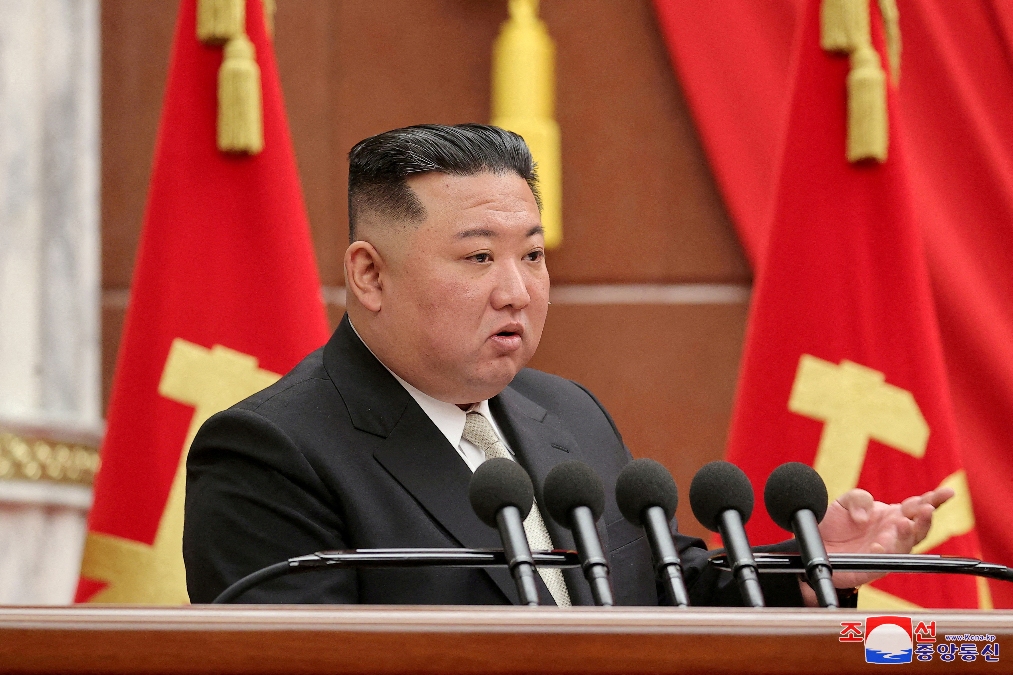
North Korea unveiled new, smaller nuclear warheads as leader Kim Jong Un called for scaling up the production of weapons-grade nuclear material to expand the country’s arsenal, state media KCNA said on Tuesday.
KCNA released photos of the warheads, dubbed Hwasan-31, during Kim’s visit to the Nuclear Weapons Institute, where he inspected new tactical nuclear weapons and technology for mounting warheads on ballistic missiles, as well as nuclear counterattack operation plans.
Experts say the images could indicate progress in miniaturising warheads that are powerful yet small enough to mount on intercontinental ballistic missiles capable of striking the U.S.
“It has something more powerful in a smaller space. … That’s worrisome,” said Kune Y.Suh, professor emeritus of nuclear engineering at Seoul National University, comparing the new warheads to the 2016 version.
George William Herbert, an adjunct professor at the Middlebury Institute of International Studies’ Center for Nonproliferation Studies, said the photos showed “a significant size improvement over prior North Korean nuclear weapons, and possibly design advance.”
Kim ordered the production of weapons-grade materials in a “far-sighted way” to boost its nuclear arsenal “exponentially” and produce powerful weapons, KCNA said.
He said the enemy of the country’s nuclear forces is not a specific state or group but “war and nuclear disaster themselves,” and the policy of expanding North Korea’s arsenal is solely aimed at defending the country, and regional peace and stability.
Kim was also briefed on an IT-based integrated nuclear weapon management system called Haekbangashoe, which means “nuclear trigger,” whose accuracy, reliability and security were verified during recent drills simulating a nuclear counterattack, KCNA said.
North Korea has been ramping up military tests, firing short-range ballistic missiles on Monday and conducting a nuclear counterattack simulation last week against the United States and South, Korea which it accused of rehearsing an invasion with their military exercises.
North Korea’s military simulated a nuclear airburst with two tactical ballistic missiles during Monday’s training, while testing underwater strategic weapons systems again on March 25-27, KCNA said in separate dispatches.
All these activities came as a U.S. carrier strike group led by the USS Nimitz is set to arrive at a naval base in South Korea on Tuesday after conducting joint military drills a day earlier.
Seoul officials said the combined exercises were designed to improve U.S. extended deterrence – the military capability, especially nuclear forces, to deter attacks on its allies – amid the North’s evolving threats. The carrier’s arrival, its first for nearly six years, also marks the 70th anniversary of South Korea’s alliance with the United States.
Pyongyang has accused the allies of stoking tensions and using exercises to rehearse an invasion.
A commentary in the Rodong Sinmun, the North’s ruling party media outlet, said the drills, especially those involving the aircraft carrier, amount to “an open declaration of war” and preparations for a “preemptive attack” against North Korea.
“The frantic war drills in the puppet region are not just military drills but nuclear war drills for a preemptive strike … pursuant to the U.S. political and military option to escalate confrontation with the DPRK and finally lead to a war,” it said.
DPRK is an abbreviation for North Korea’s official name, the Democratic People’s Republic of Korea.
(Reuters)
Inside Telecom provides you with an extensive list of content covering all aspects of the Tech industry. Keep an eye on our News section to stay informed and updated with our daily articles.